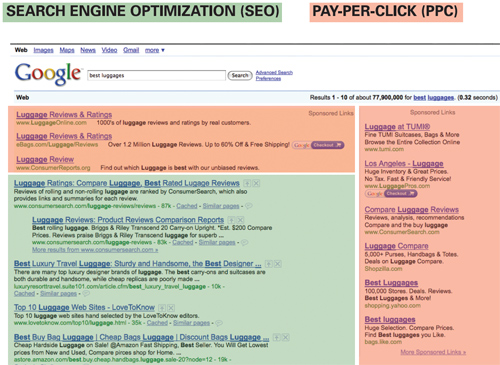In its simplest form, ecommerce is the buying and selling of products through websites. This is an excellent way to improve sales, boost traffic to the site and make a name for your company. Search Engine Optimization or SEO is needed to capture and grow organic traffic that is related to the success of your ecommerce business. There are many ecommerce SEO techniques that will benefit the natural search traffic and interest of your target audience.
First, you will need to optimize the distribution of your ecommerce homepage Rank. Since your Home page most likely has the highest ranking; the rest of the pages should link directly from the home page. You should also keep the pages within 1-2 clicks of the homepage. The pages that most consistently link from your home page will also rank higher in organic search results.
To benefit your ecommerce SEO home page, be sure to use a pure CSS based design instead of nested tables. This will allow pages to load faster and is better for ecommerce SEO. Place H1 and H2 around headings and subheadings, and use the keywords in the page titles. When evaluating the most popular site searches, place these terms around the search box.
Next, you will want to focus on the proper linking and redirects for your ecommerce SEO. Ensure that your homepage is linked to your site root folder “/”. (Sometimes, it can be linked to a default or index page instead.) You’ll also want your page to be easy to find, so if your site is www.roguemediaonline.com, you’ll want to make a 301 redirect from roguemediaonline.com to www.roguemediaonline.com. Avoid using sessionIDs in URLs and keep your URLs written in descriptive formats that keep consistent with relevant keywords.
Once you have established the linking and redirecting, you can rest assured that online users will be able to find your ecommerce site rather easily, plus be directed to the right pages. Now you will need to work with your Product Page, which should be built around targeted keywords that will help you in ranking better.
To assist with this, ensure that proper meta-keywords and descriptions are included for each product. Also add an H1 header in the product title, use the main product keywords in the page title and URL, place keywords in italics and bold and add keywords in the last paragraph of the page.
Finally, make your ecommerce SEO authentic, never duplicating the content from the manufacturer. If you do this, your website may be devalued for duplicating content. By taking the time to ensure everything is linked properly, the proper keywords are targeted and organic search results are directed to the right pages, your ecommerce site will be well on its way to success!

 One old-fashioned traffic building strategy that’s often overlooked, but can’t be under-estimated is offering content that people want to read and will recommend to their friends. Thousands of links are shared across the Internet every day just because they lead to reading material that’s interesting. Spam-like content, however, does not generate visits, as obvious as a fact as that may be. Setting out to provide content that’s ‘sticky’ is putting the cart before the horse. Being entertaining and informative isn’t a trick. It’s simply a matter of having talented writers onboard who can generate great content.
One old-fashioned traffic building strategy that’s often overlooked, but can’t be under-estimated is offering content that people want to read and will recommend to their friends. Thousands of links are shared across the Internet every day just because they lead to reading material that’s interesting. Spam-like content, however, does not generate visits, as obvious as a fact as that may be. Setting out to provide content that’s ‘sticky’ is putting the cart before the horse. Being entertaining and informative isn’t a trick. It’s simply a matter of having talented writers onboard who can generate great content. One process that is absolutely essential to the conversion of eyeballs to actual buyers, is building community. A site should not feel like the unknown. A site visitor contemplating making a purchase is inevitably more confident about doing so if they can read what other buyers of the same product or service have to say about it. While allowing a disgruntled customer to post a bad review can also drive away a sale, when that negative feedback is stacked against other positive reviews, the fact that opinions are being openly shared on a site brings credibility. Ecommerce SEO is about credibility. Credibility drives sales.
One process that is absolutely essential to the conversion of eyeballs to actual buyers, is building community. A site should not feel like the unknown. A site visitor contemplating making a purchase is inevitably more confident about doing so if they can read what other buyers of the same product or service have to say about it. While allowing a disgruntled customer to post a bad review can also drive away a sale, when that negative feedback is stacked against other positive reviews, the fact that opinions are being openly shared on a site brings credibility. Ecommerce SEO is about credibility. Credibility drives sales.





